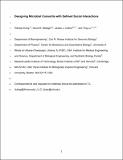Designing microbial consortia with defined social interactions
Author(s)
Kong, Wentao; Meldgin, David R.; Collins, James J.; Lu, Ting
DownloadMain article (1.698Mb)
OPEN_ACCESS_POLICY
Open Access Policy
Creative Commons Attribution-Noncommercial-Share Alike
Terms of use
Metadata
Show full item recordAbstract
Designer microbial consortia are an emerging frontier in synthetic biology that enable versatile microbiome engineering. However, the utilization of such consortia is hindered by our limited capacity in rapidly creating ecosystems with desired dynamics. Here we present the development of synthetic communities through social interaction engineering that combines modular pathway reconfiguration with model creation. Specifically, we created six two-strain consortia, each possessing a unique mode of interaction, including commensalism, amensalism, neutralism, cooperation, competition and predation. These consortia follow distinct population dynamics with characteristics determined by the underlying interaction modes. We showed that models derived from two-strain consortia can be used to design three- and four-strain ecosystems with predictable behaviors and further extended to provide insights into community dynamics in space. This work sheds light on the organization of interacting microbial species and provides a systematic framework—social interaction programming—to guide the development of synthetic ecosystems for diverse purposes.
Date issued
2018-06Department
Institute for Medical Engineering and Science; Massachusetts Institute of Technology. Department of Biological Engineering; Massachusetts Institute of Technology. Synthetic Biology CenterJournal
Nature Chemical Biology
Publisher
Nature Publishing Group
Citation
Kong, Wentao et al. “Designing Microbial Consortia with Defined Social Interactions.” Nature Chemical Biology 14, 8 (June 2018): 821–829
Version: Author's final manuscript
ISSN
1552-4450
1552-4469